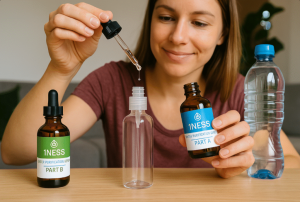If you’ve ever felt foggy, anxious, or emotionally off after a rough night’s sleep, you’re not imagining it.
Sleep isn’t just rest, it’s mental recovery, emotional reset, and gut-brain healing.
In this article, we’ll explore how sleep affects your mental health, the surprising link between digestion and sleep, and how to use natural strategies, like gut-friendly supplements, to improve both.
Sleep Deprivation and Mental Health: The Immediate Impact
Poor sleep does more than make you groggy. It actively undermines your mental well-being by:
Increasing Emotional Reactivity
When you’re sleep-deprived, your amygdala (the brain’s fear center) becomes overactive. This can lead to:
- Mood swings
- Irritability
- Heightened emotional sensitivity
Over time, this can contribute to anxiety and depression.
Lowering Cognitive Function
Lack of sleep reduces:
- Focus
- Memory
- Decision-making abilities
You may feel like you’re “just not yourself”, because your brain hasn’t had time to recharge.
Elevating Cortisol (Stress Hormone)
Chronic sleep deprivation spikes cortisol, locking your body in fight-or-flight mode and making it even harder to fall asleep the next night. It’s a vicious cycle that can erode your emotional resilience.
The Long-Term Effects of Sleep Deprivation
Sleep isn’t a luxury, it’s a biological requirement for mental and emotional health.
Linked to Depression
Chronic insomnia is one of the strongest predictors of clinical depression.
Contributes to Anxiety
People with Generalized Anxiety Disorder often report sleep issues as both a symptom and a trigger. Healing begins with restorative sleep.
The Gut-Brain Connection: Sleep’s Secret Partner
What does your digestive system have to do with your sleep and mood?
Everything.
The gut-brain axis is a two-way communication system connecting your gut to your brain via the vagus nerve. A healthy gut helps regulate:
- Serotonin (your mood stabilizer)
- Melatonin (your sleep hormone)
- Cortisol (your stress hormone)
And guess what?
Over 90% of serotonin is produced in the gut, not the brain.
How Poor Gut Health Wrecks Your Sleep and Mood
When the gut microbiome is imbalanced from:
- Processed food
- Artificial sweeteners
- Inflammation or stress
…your brain feels the consequences.
Symptoms include:
- Insomnia
- Depression
- Brain fog
- Anxiety
That’s why healing the gut is step one for improving sleep and emotional well-being.
How Sleep Restores Brain Function
Sleep is not passive downtime. It’s when your brain actively:
Clears Out Toxins
The glymphatic system removes harmful waste like beta-amyloid plaques (linked to Alzheimer’s).
Poor sleep = toxic buildup = brain fog and cognitive decline.
Consolidates Memories
During REM sleep, your brain organizes new information, aiding memory, learning, and emotional processing.
Regulates Emotions
Quality sleep stabilizes emotional centers like the amygdala and prefrontal cortex. Without it, your brain can’t self-regulate stress or mood.

Supplements to Support Sleep via Gut and Lung Health
Aging bodies may struggle to produce enough digestive acids, detox efficiently, or maintain a balanced gut. This affects both sleep and mental clarity. Fortunately, natural tools can help:
Soursop Extract
- Supports digestion
- Reduces gut inflammation
- Promotes mental calm + serotonin regulation
Explore Soursop Cell Regenerator Tincture
Mullein Leaf Extract
- Improves lung health and oxygen flow
- Supports deeper, more restful sleep
- Especially helpful for seniors with shallow breathing at night
Shop Mullein Extract
Hydrochloric Acid Drops
- Improves nutrient absorption (magnesium + B vitamins = essential for brain)
- Reduces GERD and acid reflux that interfere with sleep
Learn More: Benefits of 4-HCl
Artificial Sweeteners: A Hidden Sleep Disruptor
Think sugar-free means safe?
Think again.
Artificial sweeteners like aspartame and sucralose have been shown to:
- Disrupt gut bacteria
- Impair neurotransmitter production (like serotonin and dopamine)
- Increase risk for insomnia, anxiety, and depression
Ditching sweeteners may be the simplest first step toward gut healing and better sleep.
Read More: Are Artificial Sweeteners Harming Your Health?
- How to Improve Sleep and Mental Health, Naturally
You don’t need pharmaceuticals to start sleeping better. Try this holistic 4-step strategy:
- Step 1: Heal Your Gut
Begin with fiber-rich and fermented foods.
To support digestion, add supplements like soursop or HCl. - Step 2: Regulate Breath and Oxygen
Enhance lung health and sleep depth with mullein extract.
In addition, try deep breathing exercises before bed to relax your nervous system. - Step 3: Unplug Before Sleep
Instead of screens, unwind with journaling or calming books an hour before bed.
This simple shift can greatly improve sleep quality. - Step 4: Stay Consistent
Aim for the same bedtime each night.
Moreover, keep your room dark, cool, and quiet to support deep, uninterrupted rest.
Get 10% Off All Natural Sleep + Gut Support Tools
Ready to sleep better, think clearer, and feel emotionally stronger?
We’ve bundled our most powerful tools for gut-brain-sleep health:
- Soursop Cell Regenerator Tincture
- Mullein Leaf Extract
- 4-HCl Digestive Drops
Use code AGEWITHPURPOSE at checkout for 10% off
Claim Your Sleep Bundle Discount
Join the Wellness Community (For Ages 45+)
Want support, tips, and encouragement on your sleep and gut-healing journey?
Join the Aging with Purpose & Connection Community:
🔗 Join the Facebook Group
Final Thoughts: You Can’t Heal the Mind Without Healing the Gut
Poor sleep isn’t just a nuisance, it’s a message from your brain and gut that something’s out of balance.
The good news?
Your body already knows how to heal. You just need to give it the right tools and space to recover.
Start with your gut.
Support your lungs.
Honor your rest.
And watch your clarity, calm, and confidence return.





